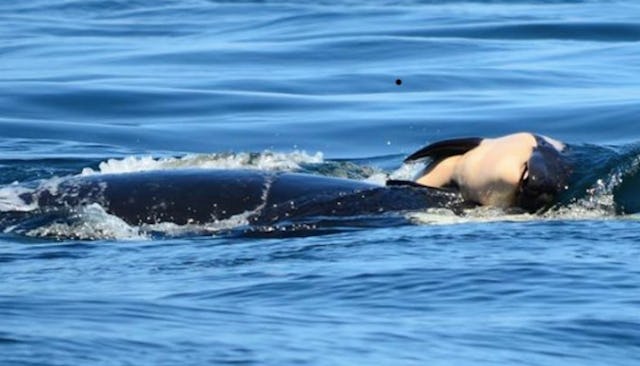A Grieving Orca Mom Carried Her Dead Calf Around The Ocean For Days

The endangered whales will only give birth 3-5 times in her life
In news that will break your heart into one billion pieces, a mother orca whale was spotted carrying her dead calf off the coast of Vancouver Island, grieving its loss for more than four days. Like a mother from any species, she’s shattered by her baby’s passing — and so are we.
“We are saddened to report that a baby Southern Resident killer whale (SRKW) died a short time after it was born near Victoria, British Columbia on July 24, 2018,” the Center for Whale Research posted to their Instagram page. “The newborn whale was reported alive and swimming with its mother, J35, and other members of J pod near Clover Point on the Victoria shoreline in mid-morning.”
The killer whale gave birth last Tuesday, and after swimming together that morning near Victoria, British Columbia, the calf unfortunately passed away. “The baby’s carcass was sinking and being repeatedly retrieved by the mother, who was supporting it on her forehead and pushing it in choppy seas,” said the Center for Whale Research in a statement. “The mother continued supporting and pushing the dead baby whale throughout the day until at least sunset.”
Cue the hearts of all mothers everywhere breaking. Whale or human or dog or monkey, animals love their babies. This momma is in mourning — and we can all feel her pain.
According to the organization, calf mortality is, sadly, extremely high during the first year of life and approximately 37–50 percent of all calves die during their first year. “Seven species in seven geographic regions covering three oceans have been documented carrying the body of their deceased young,” researchers told the Seattle Times.
“You could see the calf had not been dead very long, the umbilical cord was visible,” research biologist Robin Baird said. “When we were watching, all the rest of the whales were separated by a distance, and they were just moving very slowly. She would drop the calf every once in a while, and go back and retrieve it.”
The other whales in J35’s pod left shortly after the baby’s death, but the mom stayed with it, refusing to let it go. Beyond the emotional toll it’s taken, J35 will be physically exhausted as well — calves are born weighing around 400 pounds and six to seven feet long.
According to the statement, a San Juan Island local witnessed part of the pod’s grieving process and reported the heartbreaking ritual the whales were observing. “At sunset, a group of 5-6 females gathered at the mouth of the cove in a close, tight-knit circle, staying at the surface in a harmonious circular motion for nearly 2 hours. As the light dimmed, I was able to watch them continue what seemed to be a ritual or ceremony. They stayed directly centered in the moonbeam, even as it moved. The lighting was too dim to see if the baby was still being kept afloat. It was both sad and special to witness this behavior. My heart goes out to J35 and her beautiful baby; bless it’s soul.”
These Southern Resident killer whales are a group of 76 orcas, all in danger of extinction, the organization said. Lack of food, ship traffic, and toxins all cited as reasons.
“It is horrible. This is an animal that is a sentient being. It understands the social bonds that it has with the rest of its family members,” Deborah Giles, research scientist for University of Washington Center for Conservation Biology said. “She carried the calf in her womb from 17 to 18 months, she is bonded to it and she doesn’t want to let it go. It is that simple. She is grieving.”
This article was originally published on